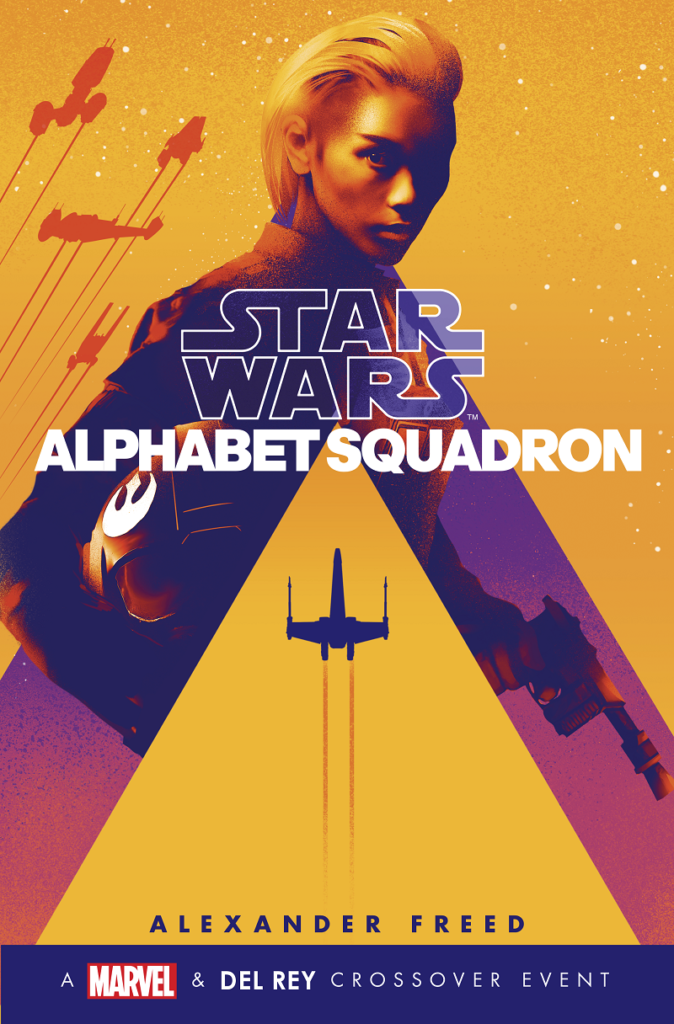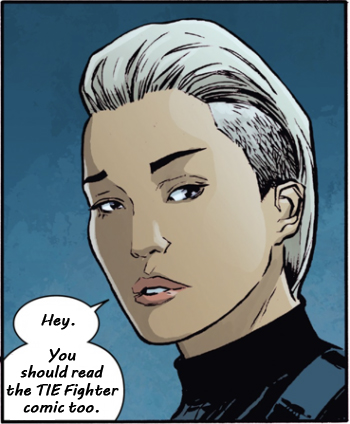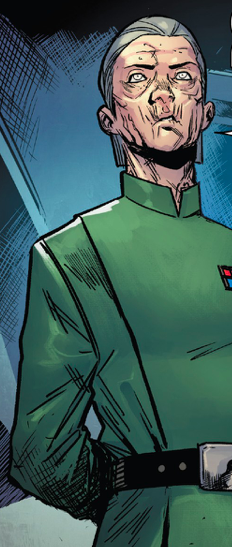The introduction of this piece is spoiler-free. If you don’t want details of Alphabet Squadron a warning will let you know when to stop.

We think we’ve seen this story before. But we haven’t.
There are certain types of stories in Star Wars that seem to recur again and again. Stories of Imperial defectors joining the Rebellion / New Republic tend to be among the most common of them. Even since the continuity reboot of 2014, we’ve seen stories of defectors more than once. Zare Leonis, Thane Kyrell, Sinjir Rath Velus, Alexandr Kallus, and Iden Versio were all Imperial defectors. It’s a type of story we know well: a character believes in the Empire and its mission, comes to a realization or crisis of conscience (often during an atrocity), and joins the good guys with their past seemingly forgotten and behind them. The stories play out a bit differently each time and the specific details vary — but the broad strokes are the same.
Those small differences do matter. In a galaxy-wide Empire, we would figure (or hope) that it’s a common thing for people in the Emperor’s service to recognize the error of their ways and defect. The details affect how the story is told, and even why it’s told. Famously, Battlefront II’s promotional materials led us to believe that Iden Versio and her Inferno Squad were helping to establish the die-hard First Order. When the predecessor novel Inferno Squad underscored the idea that Iden and her group were Imperial loyalists, we were surprised that Battlefront II would end up being a story about defection from the Empire. Rather than being “gotcha” subversion for the sake of a twist, it invited the reader to look again at the novel and look at the seeds that had been planted; it turned out that the story was less about defection and more about the whys and the hows and the what-nexts of defection.
Alexander Freed’s Alphabet Squadron examines all of this — the ideas and expectations we have for Imperial defectors and the idea of subversion of expectations less for its own sake and more for telling a more interesting story. Beyond that, Freed does what Freed does best — he grounds the story in reality and causes painful realizations through the characters’ emotional journeys. Sure, defection is common — but what does that mean in a post-Endor, post-Operation Cinder galaxy where the Empire really has outstayed its welcome? And just how trusted would an Imperial defector be by those who the Empire has harmed not just once, but many times? Is there such a thing as too little, too late?
Former Imperial pilot Yrica Quell is our window into all of this — we see things from her perspective, and from outside her perspective. She’s the leader of a fighter group, but she’s not the unifying squad leader that we’re used to in pilot stories. She holds herself apart — both because of her past and because of her actions, and that what makes her interesting. Alphabet Squadron is a story about many things — but I want to dig most deeply into Yrica Quell and the topic of Imperial defectors.
Article will contain spoilers after this point! If you have not yet finished the novel and do not wish to be spoiled, come back to the rest of the article later!
Unlearn what you have learned
The Star Wars publishing canon has done a good job of showing why people join the Empire, and how the Empire corrupts the people who buy into the system. I’ve written previously how Disney-Lucasfilm Press’s Lost Stars and Imperial Justice gave us a fascinating look into how the Galactic Empire warps value systems and obtains the loyalty of its servants, and Del Rey’s Inferno Squad showed us how Imperial loyalists distortedly processed the destruction of Alderaan and the Battle of Yavin. Alexander Freed’s Alphabet Squadron shows us the other end of that formula in a very deep way. As we all know, this is far from the first time we’ve looked at defection from the Empire — but in my view, this is the first time we’ve looked at defection from the Empire as deeply as we’ve looked at Imperial propaganda/brainwashing.
A lot of how this story functions is by playing with reader expectations about what a story about an Imperial defector is supposed to look like. We know how it goes. Imperial officer gets asked to perform atrocity, balks, and joins the good guys. Yrica initially frames her defection this exact way. During our discussion of Yrica Quell on the podcast Kanjikast, my co-host pointed out that the flashback sequence with Yrica at the beginning of the novel is introduced with the words “this is the story she told.” It’s also the story the novel tells us, the audience. There’s a double-meaning there, and the words are priming us to think that this isn’t the true story — but we think we know the story and we have no reason to doubt it.
Similarly, there’s a double meaning to the discussion of defectors at the beginning of the novel that won’t pay off until we know the true story. When Yrica is in the New Republic holding facility for Imperial defectors – the aptly-named “Traitor’s Remorse” — she muses on the different waves of defectors that are contained in the facility. The first wave, those that joined after Endor, are the most likely to have joined for moral reasons. The next wave, those that joined after Cinder, are less reliable, a little more dirty in their reputation. And those who still fought for the Empire after Cinder? They’re the true Imperial loyalists, and there’s perhaps no telling what they wouldn’t do. If they defect, they aren’t trustworthy at all. We think we know which group Yrica belongs to, and it shapes our feelings about her and our sympathies for her.

Yrica guards her feelings well. She keeps them hidden from her New Republic Intelligence handler, her squad of pilots, and even from the reader. To everyone, it just seems that she just wants to find a purpose, to belong. That’s reasonable, we figure. The only person who really doubts the sincerity of her motives is her handler Adan, and he’s a slippery intel spook that rubs the audience the wrong way. We’re not inclined to like him or his perceived persecution of Yrica. When Adan turns out to be right in some respects — it’s a double betrayal. First, because he had Yrica’s squadmate Nath dig into her background (someone else we are led to somewhat dislike, despite his charm) and second because it turns out that something was off about Yrica.
But we’ll get to that.
Belonging – and the Walls that prevent it
Just as we think we’ve seen a story about Imperial defectors before, we think we’ve seen a story about a squadron of misfits before. But Alphabet Squadron isn’t Wraith Squadron, for quite a few reasons. They’re broken and dysfunctional, yes. Their stories are emotionally painful, especially if you get attached to the characters. But they’re not washouts — they’re broken by tragedy, and there’s precious little humor involved. And thus far, they are having a lot more struggles coming together as a unit — and that’s where Yrica and her defector background comes in.
Yrica once belonged. She belonged to Shadow Wing, even more than she belonged to the Galactic Empire. We learn that she joined to learn how to fly, but her sympathies actually would’ve lain with the Rebellion. Things changed over time though, she became part of a squad. But it wasn’t belonging like we see in Rebel fighter squadrons from the X-Wing series, or even Inferno Squad from the new material — aside from Yrica’s mentor, Major Keize, she didn’t really bond too closely with her squadmates. She just fit into the team.
Initially, that’s part of why she has trouble fitting in with the squadron. Yrica keeps to herself, doesn’t socialize with her squadron, and doesn’t get to know them. We’re trained to think that’s wrong too — and in a way, it’s admirable to see an introverted character in a leadership position. Yrica doesn’t have any drive to get to know them as people, she just wants them to play their roles they way they would in an Imperial squadron: every piece contributing professionally to the whole. She doesn’t just turn into a Rebel overnight, doesn’t start acting like a Rebel overnight — and people don’t like that about her. Yrica eventually overcomes this, not necessarily by changing who she is or becoming someone she’s not — but by taking the advice of General Hera Syndulla and letting the squadron know that she’d fight for them, so they’d fight for her.
Yrica doesn’t change on a dime, and she doesn’t become a new person. Her Imperial manner — the one that makes the New Republic pilots and officers see her as an other — never really changes that much. She just learns to adapt it to her new circumstances. That’s something different in Star Wars, and it’s thoughtful. Especially because we know that while she’s earned the support of her pilots, this is just the beginning of their journey together.
Of course, the audience learns at the end of the novel that Yrica didn’t really ever give up on the Empire. She didn’t defect because she had a crisis of conscience — but because her commanding officer essentially ordered her to, because she would otherwise keep doing what she was doing despite the mental and physical toll it was taking on her to follow the Empire’s post-Cinder orders.
Staying the Course
The characters who chose to stay with the Empire are just as interesting as Yrica.

Colonel Shakara “Grandmother” Nuress is the leader of Shadow Wing who commands it through Operation Cinder and beyond. First introduced in Marvel’s TIE Fighter comic series, she’s an old warhorse who fought for the Republic in the Clone Wars and views everything through the same lens, to the point of intentionally calling the Rebels “Separatists.” They’re all the same to her, and Palpatine led them through the war then and his dead hand will lead them through the war now. She’s a fascinating character and one who I wish we got to know more (and I’d love to write a whole article on her! Perhaps after the comic series finishes?). Through all the warlordism and chaos of the post-Cinder Empire, Grandmother stayed true to the loyalist cause and refused to strike out for power on her own. More importantly, when Cinder’s orders came down — she performed the atrocities without question.
Except — and here’s where things get interesting — Grandmother knew better. She believed in the Empire, and believed in Palpatine. She believed that the Emperor must have had a greater plan — and that when innocents were killed, there had to be a reason for it. She dies still hoping that, but perhaps knowing in her heart of hearts that Operation Cinder was for nothing — or perhaps just for malice, as the Emperor’s Messenger bot stands silent above her dying body. She doesn’t even get absolution in the end, and she goes knowing that the atrocities she performed were not for a higher purpose. Did she always know? Perhaps some part of her did, and she stayed the course anyway.
Similarly, the character we know as Devon keeps trying to make a new life for himself. He’s a former Imperial, and his past keeps coming back to haunt him. He can never find a true home for himself after the war. By the time we learn who he really is, we realize why there will be no peace for him — and why he ends up joining the Empire again almost out of default. In a novel about defection, we realized that he missed his chance — by staying noncommittal, by hoping he could just leave the past behind him, he avoided absolution himself.
Yrica Quell, late half-hearted defector to the New Republic, may yet find redemption and absolution for herself. Only time will tell. But time ran out for both Colonel Nuress and Major Keize.
So much more to say
I thought this would be a simple, focused take on Imperial defectors. But honestly, each paragraph of this article could have been a separate article. There’s so much to say about the different waves of Imperial defectors, the ways that they adjusted to the New Republic, the way the New Republic treated them, Yrica Quell’s introversion and mental issues and how those were unique for a Star Wars protagonist, and the Operation Cinder loyalists who refused to leave the Empire. But I have to settle for a little bit of everything, because that’s what this novel gives us too.
Alphabet Squadron is a lot of things. It’s much more than a revived X-Wing series, although it’s certainly worthy of that mantle (down to the pilot slang and memorable characters). It’s an ensemble piece that’s also a deep character study, not just of Yrica Quell but of each character. It’s a story about peace after a war has been (mostly) won and how messy that is. It’s a realistic, sober take on defection and its complications. It’s a meditation on war crimes and the absolution (or lack thereof) associated with them. It’s a story about failure and mental illness. And it’s a story about succeeding despite all of that.
Alexander Freed is known for writing great Star Wars books, and this may be his finest yet. And the best part? This is just part one of three. I look forward to seeing where the rest of the trilogy takes us. I have some thoughts, but though I think I know where this story is going to go — I bet it’ll surprise me, while feeling logical and sensible all along.

With the real(er) version of Nacronis coming so soon after Nuress’s death, I couldn’t help but see Nuress as the exact person Keize was afraid Yrica would become—someone who fully recognized the evil she was participating in but who’d gone too far to stop and would die still clinging to the hope that there’d been a point to it.
Loved Alphabet Squadron for all the reasons you described.